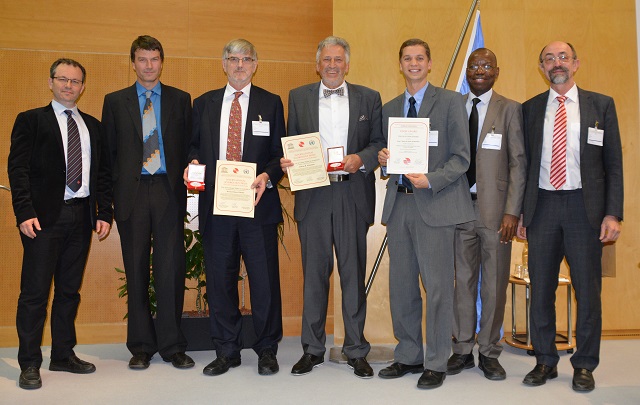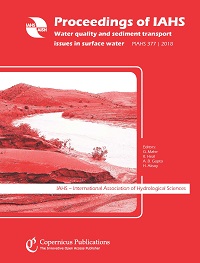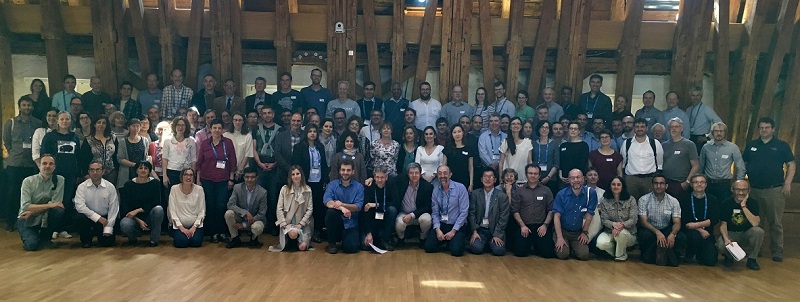IAHS News
Updates to our privacy notice
We are fully committed to keeping your information private. We have updated our privacy policy and invite you to take a look (https://iahs.info/About-IAHS/Data-Protection-Privacy-Policy/).
In summary, we do not share your personal details with third parties with the exception of Samui, the managers of the iahs.info website and Taylor & Francis to facilitate the access to HSJ online where required, and they have an obligation to IAHS to only use the data for the purpose for which it was transferred. The IAHS does not collect your financial information as membership is currently free. Payments for publications and subscriptions are processed by PayPal or credit card and your details are not stored or retained.
If you want to continue receiving messages from us, you don't need to do anything. If you want to stop receiving some or all of our messages, please follow the instructions below.
Click here (https://iahs.info/ezines/unsubscribe.do) to unsubscribe from all of the email distribution lists.
To have all your membership information permanently deleted email [email protected].
Thank you
Claire Lupton
IAHS Executive Secretary
2018 Summer Schools
Please find below two announcements of Summer Schools.
The Summer School on Runoff Predictions in Ungauged Basins will run at the TU Wien, Austria from July 1-6, 2018. The purpose of the Summer School is to learn methods for estimating runoff characteristics in the absence of local runoff observations.
http://www.waterresources.at/fileadmin/user_uploads/News_items/PUB_2018_Flyer.pdf
The 9th Annual Catchment Science Summer School will run at the University of Birmingham UK from Aug 26-31, 2018. The course is designed for PhD students and Post Docs in catchment science.
https://www.usask.ca/watershed/teaching/catchment-science-summer-school.php
Please forward to potentially interested people.
Best wishes
Günter Blöschl
IAHS President
2018 International Hydrology Prize medalists and Tison award ceremony
Congratulations to the recipients of the International Hydrology Prize (Dooge medal and Volker medal) and Tison award for 2018!
 Left to right: Christophe Cudennec (Secretary General IAHS), Johannes Cullmann (Director, Climate and Water Department WMO), Howard Wheater (Dooge Medal Recipient), Andreas Schumann (Volker Medal Recipient), Ryan T. Bailey (Tison Award Recipient), Abou Amani (Chief of Section HSS, UNESCO), Günter Blöschl (President IAHS).
Left to right: Christophe Cudennec (Secretary General IAHS), Johannes Cullmann (Director, Climate and Water Department WMO), Howard Wheater (Dooge Medal Recipient), Andreas Schumann (Volker Medal Recipient), Ryan T. Bailey (Tison Award Recipient), Abou Amani (Chief of Section HSS, UNESCO), Günter Blöschl (President IAHS).
The International Hydrology Prize is awarded annually by IAHS, with UNESCO and WMO, to two people who have made an outstanding contribution to hydrological science. The 2018 IHP medals were awarded during the WMO Conference for Prosperity through Hydrological Services (HydroConference) as follows:
IHP Dooge Medal: Howard Wheater (Canada)
"In recognition of his international leadership in hydrological research of scientific excellence, coupled with its translation into policy and practice and application worldwide.” For the full citation and response see the IAHS webpage https://iahs.info/About-IAHS/Competition--Events/International-Hydrology-Prize/International-Hydrology-Prize-Winners/H.Wheater.do
IHP Volker medal: Andreas Schumann (Germany)
“For pioneering contributions to water resources research for the benefit of society”. For the full citation and response see the IAHS webpage https://iahs.info/About-IAHS/Competition--Events/International-Hydrology-Prize/International-Hydrology-Prize-Winners/A.Schumann.do
The Tison award was presented to Ryan Bailey and is shared by Ryan T. Bailey (USA) & Saman Tavakoli Kivi (Iran) for the paper:
Ryan T. Bailey & Saman Tavakoli Kivi (2017) Method for estimating available groundwater volume of small coral islands, Hydrological Sciences Journal, 62:14, 2381-2392, DOI: 10.1080/02626667.2017.1382703
The IAHS Tison Award, established in 1982, aims to promote excellence in research by young hydrologists. The Award is granted for an outstanding paper published by IAHS in a period of two years previous to the deadline for nominations.
For the full citation and response see the IAHS web page: https://iahs.info/About-IAHS/Competition--Events/Tison-Award/Tison-Award-winners/Bailey--Tavakoli-Kivi/
The paper is available open access.
First two 2017 IAHS Scientific Assembly PIAHS volumes now available online
The first two volumes of proceedings from the IAHS 2017 Scientific Assembly are now available online open access as PIAHS volumes 376 and 377

Volume 377, 2018 Water quality and sediment transport issues in surface water
IAHS Scientific Assembly 2017, Port Elizabeth, South Africa, 10–14 July 2017
Editors: G. Mahe, K. Heal, A. B. Gupta, and H. Aksoy
Volume 376, 2018 Water security and the food–water–energy nexus: drivers, responses and feedbacks at local to global scales
IAHS Scientific Assembly 2017, Port Elizabeth, South Africa, 10–14 July 2017
Editors: G. Jewitt and B. Croke
The articles are available for download and printed versions of the volumes are available from Copernicus.
IUGG annual report
8th Global FRIEND-Water Conference Abstract deadline extended to 30 April
- Hydrological observations under the changing environment and scarcity
- River regimes and hydrological extremes under the changing environment
- Simulation and prediction of surface water and groundwater processes under the impact of human activities
- Urban hydrology and sponge city
- Multi-objective water resources allocation and operation
- Integrated watershed management including eco-hydrology and socio-hydrology
- Water quality and sediment transport including coastal hydrology: changes under climate change and human activities
- River health and ecological baseflow under changing environment
A post conference technical tour will be arranged to visit water related projects and facilities of Beijing.
The key dates are now as follows:
Abstract submission deadline: April 30, 2018
Notification of acceptance (oral or posters) and invitation issue date: May 15, 2018
Full paper/Extended Abstract submission deadline: July 30, 2018
Full information is available at http://8thfriendwater.iwhr.org/40?lang=en
Report from Vienna Catchment Science Symposium, Saturday 14th April, 2018
On the Theme of: 23 unsolved problems in Hydrology that would revolutionise research in the 21st century
Report
We had excellent meetings on Friday 13 April 2018 (Splinter meeting at EGU in Vienna) and on Saturday 14 April (Vienna Catchment Symposium at TU Wien) with about 60 and 110 people attending, respectively.These are the questions resulting from the LinkedIn discussion, the Friday Splinter meeting and additional email contributions received before Friday.
https://iahs.info/uploads/Unsolved%20Problems%20in%20Hydrology/Questions_13_April_2018_edited1613.pdf
On Saturday we had three rounds of discussions in four break out groups and one final plenary discussion. In each round we discussed the questions, merged them, split them and reworded them as needed followed by a voting on prioritising the questions. The voting was for gold/silver/bronze/remove in each of the three break out group rounds. Only the gold and silver ones were retained for the plenary with an additional round of voting (by the entire plenary) for gold, silver or removing them from the list. The idea of the process was to whittle down the 260 questions initially proposed to a more coherent and smaller set of those questions deemed most important by the participants. The process resulted in 16 gold and 29 silver questions which are posted here.
https://iahs.info/uploads/Unsolved%20Problems%20in%20Hydrology/Questions_14_April_2018_plenary.pdf
A paper drafting team (Günter Blöschl, Elena Toth, Jeff McDonnell, Gia Destouni, Antonio Chambel, Elena Volpi, Jim Kirchner, Marc Bierkens, Christine Stumpp, Christophe Cudennec, Hubert Savenije, Siva Sivapalan, Aldo Fiori) has been formed to
- check whether there are any obvious ‘holes’ in the list and propose a small number of additional questions if needed
- wordsmith the questions
- start with an initial draft of the summary paper.
The updated list of questions will be circulated among the co-authors (those who have substantially contributed to the process which will be around 160 scientists) with a final voting on the list, and the co-authors will also be asked to provide suggestions for any changes to the paper draft.
The plan is to submit the paper to HSJ.
Many thanks again for all your contributions
Günter

HSJ Special Issue on “Hydrological Data: Opportunities and Barriers”
To elevate and expand the discussion of the critical role of data in all aspects of the hydrological sciences, a Special Issue of the Hydrological Sciences Journal entitled “Hydrological Data: Opportunities and Barriers” is being planned for publication. Articles are currently being sought on all aspects of data in hydrology; from traditional concerns related to networks to more contemporary thinking about simple, low cost innovations in instrumentation, data management and exchange protocols, and big data, as in large-scale multi-model ensembles spanning long time periods. Numerous emerging activities and topics provide a substantial source of potential contributions.
For example, the assimilation of data from new observation technologies is an expanding issue which has given rise to activities and efforts within the scientific community, the operational services and the facilitating mechanisms of the United Nations towards measurements and observations in the twenty-first century, innovative water monitoring capabilities and data exchange, virtual labs to facilitate observation-modelling progress; as well as an array of efforts involving citizen science, simple and inexpensive instrumentation, remote sensing innovations, and studies involving the comparative assessment of using a limited number of research basins versus a relatively large number of management basins (e.g., PUB and its ongoing follow ups).
Similarly, data assimilation among various system components in the modeling of hydroclimatology and hydrometeorology, and their interfaces with the land surface, ecological and social systems, and others is moving forward – especially within the framework of the Panta Rhei initiative. Moreover, the emerging focus on the water-food-energy nexus reflects not only the increasing demand for data within each sector, but for viable approaches to their integration that ensure water and food security, sustainable agriculture, and energy production worldwide.
The recent discussions of big data and emerging efforts associated with the shaping of "data science" are crucial concerns for the future of hydrology and should be explored. Also, a number of concerns dealing with retrospective investigations are data-dependent, with particular worries related to data archiving and data rescue.
Moreover, hydrological data are typically obtained through a combination of observations and computational algorithms. For example, river discharge is most often estimated from water level via a rating curve; multi-spectrum analysis of satellite data is frequently combined with multiple information sources to produce a variety of Earth observation products; and observed time-series are used to estimate parameters in complex dynamic hydrological models. As a result, the boundary between observed and computed data is often vague and, considering the degree to which such data are shared, re-used and cited, it can be difficult to trace their provenance.
Notably, a strong and vigorous debate on data could be critical to the development of new policy messages regarding observing networks; i.e., their density, quality, sustainability, investment, modernization, etc. Such a debate may also serve as an important contribution to the development of inputs from the hydrological sciences to achieving the Sustainable Development Goals that, at their core, are data dependent, especially along the observation-knowledge-indicator-target value chain.
The data issue is an increasingly import aspect of the publication industry, where inveterate concerns over open access to data have long vexed the community. The emerging interest in providing datasets as supplementary materials to papers is an encouraging sign, and periodicals like the Hydrological Science Journal take this opportunity to develop and promote such policies for their operations. IAHS could use this Special Issue as a basis for developing new and related portals on iahs.info .
Finally, it is critical that corresponding competencies in hydrology be identified for education and capacity building, particularly with respect to data issues. Numerous organizations are working on these issues and contributions reflecting new efforts in this area are of particular interest.
Guest editors
Christophe Cudennec (Agrocampus Ouest, France & IAHS, Managing Guest editor), Berit Arheimer (SMHI, Sweden), Harry Lins (WMO Commission for Hydrology, USA), Stefan Uhlenbrook (UNESCO World Water Assessment Programme, Italy)
Submission
Submission is welcome by 1st November through the Hydrological Sciences Journal online platform https://www.tandfonline.com/toc/thsj20/current
We strongly encourage potential authors to contact first the Managing Guest Editor at [email protected] to inquire about the suitability of their manuscript and about any innovative concept.
Accepted papers will be immediately published along the flow.
23 Unsolved Problems in Hydrology - Update
The list will be discussed during the Splinter meeting on Friday, 13th April 2018 at EGU in Vienna and further discussed and finalised at the 2018 Vienna Catchment Science Symposium - "23 unsolved problems in Hydrology that would revolutionise research in the 21st century", on Saturday, 14th April, at Vienna University of Technology http://www.waterresources.at/fileadmin/user_uploads/News_items/VCSS_Programme_2018_v4.pdf .
The forum welcomes inputs and discussions until next Thursday, 12th April before the meetings in Vienna on Friday and Saturday.
International Conference on Natural Hazards and Risks in a Changing World
The registration for the "International Conference on Natural Hazards and Risks in a Changing World" is now open! The conference will be held at the University of Potsdam (Campus Griebnitzsee) in Potsdam, Germany, from 4-5 October 2018.
The purpose of this conference is to bring together researchers from natural sciences (e.g. hydrology, meteorology, geomorphology, hydraulic engineering, environmental science, seismology, geography), risk research, nonlinear systems dynamics, and applied mathematics to discuss new insights and developments about data science, changing systems, multi-hazard events and the linkage between hazard and vulnerabilities under unstable environmental conditions. Knowledge transfer, communication and networking will be key issues of the conference. The conference will be organized by means of invited talks given by outstanding experts, oral presentations, poster sessions and discussions.
Already confirmed speakers are:
1) Prof. Dr. Matthias Holschneider (University of Potsdam, Institute of Mathematics): Data Science
2) Prof. Dr. Hans Joachim Schellnhuber (Potsdam Institute for Climate Impact Research (PIK) Potsdam): Changing Systems
3) Prof. Dr. Jakob Rhyner (United Nations University, Institute for Environment and Human Security): Cascade and Multi-Hazard
4) Prof. Dr. Jeroen Aerts (VU Amsterdam, Institute for Environmental Studies): Linking Hazard and Vulnerability
Please submit your abstract of 300-500 words, including title, author‘s name, and affiliation until 15th May 2018 via the link: http://www.j-work.de/up/nathazardsrisk/
Letters of acceptance/rejection will be send to the corresponding author before 15th June 2018. Registration can be done until 4th September 2018 via the link: http://www.j-work.de/up/nathazardsrisk/
For organizational reasons, attendance is limited in number.
We are happy to announce that the German Committee for Disaster Reduction (DKKV) will award the Young Professionals Award “Preparedness 2030“ at the conference. DKKV wants to highlight and promote outstanding theses in any field consistent with disaster reduction. The call for contributions and further information can be found at www.dkkv.org . The application deadline for the “Preparedness 2030“ Award is 1st of August 2018.
More details about the conference can be found in the attached flyer.
We are looking forward to welcoming you in Potsdam!
Kind regards,
Theresia Petrow

